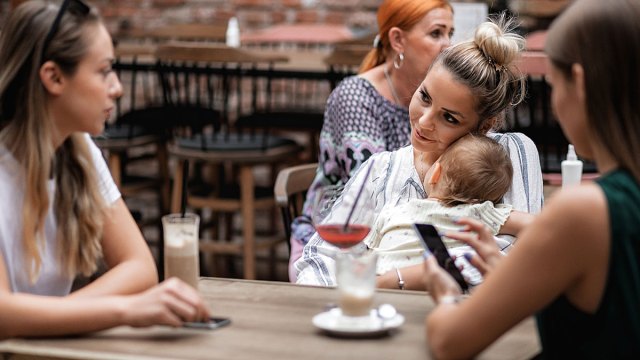When my son was still a baby, I attended a dinner party with some of my husband’s colleagues. I sat at the table and tried to enjoy a lavish meal I did not cook, a glass of wine, and time away from the relentlessness of nursing and soothing and diapering.
I couldn’t enjoy it. My breasts were hard and tingling, aching to be pumped. The zipper of my pants dug into my belly. Being in the world without the weight of my baby in my arms made me feel dizzy, panicky even. My brain felt foggy and slow.
My husbands’ colleagues spoke of crises at work, of the TV shows they were binging on the weekends, of trips they were planning, of hobbies. It was as if they lived in another world, the world of adulthood. I, too, had been part of it, but I felt I’d left the day I gave birth.
I didn’t feel transported to some elevated plane. I believed I had become the most boring person on the planet.
“How was your day?” a woman beside me asked. I struggled to form a response. I began talking about my son’s feeding schedule, his sleep schedule, his bowel movements. His bowel movements! Why was I speaking about my baby’s bathroom habits at a dinner party?
I was sure I’d lost my mind. I was convinced that my temporarily contracted world of early motherhood had made me regress, too. When I returned home, I thanked our sitter who sat on the living room couch with our sleeping son. Then I settled back into the monotony of motherhood, that three-hour routine on repeat.
The next day during one of my son’s brief naps, I found myself consumed with anxiety—not about my baby, but about my identity. What little there was left of it.
I thought to myself: I’m going to become interesting again. Because I am an English teacher, an avid reader, and a writer, I decided to try to fix myself with words.
I opened a notebook and began to write. Something interesting! I coached myself. But a sentence or two into my exercise, I found myself circling around the same topic I kept discussing at that dinner party: minutiae about my baby.
After about a page, my baby began to coo in his crib. That was that. My fleeting minutes of “me time” were gone. I retrieved him from his crib and held him in my arms.
The house was so quiet—just me and my baby—so I turned on some music, Beyonce’s “Lemonade,” to be exact. The two of us had a dance party to fill the stretch of hours until our next feeding, diapering, and sleeping session.
I remember this dance party because, the next day, I wrote about it. Writing made me happy, so I decided to keep journaling during my brief pockets of free time. I didn’t have anything interesting to say about the world—so I gave myself permission to lean into what occupied my headspace: my baby. I wrote about our dance parties. His favorite picture books. His first words.
In writing, I discovered patterns. His favorite word was “bird.” He used it to identify anything fascinating or, I realized, beautiful. A tree was a bird, and a bird was a bird, and so was a flower and the wind. At the grocery store, my son pointed to a man’s baseball cap and exclaimed, “bird.” And when he nursed, he made me re-see my own anatomy, when he paused from his feed to point to my nipple and cry out, “bird!”
For a year, maybe two, all my creative energy orbited around my son. I have written evidence of this. But then, eventually, it did not. The change was gradual. It was not forced. But eventually, as my son began to walk, and then to run, I, too, was able to fly back to the world I’d previously inhabited.
Now that my son is almost seven, I feel more open than ever before. My creative energy is channeled toward him, but also to so many other places. Motherhood led to my growth, not my diminishment.
But that’s not how it felt during that first year. If I could go back to my new mom self, I would reassure her and say, “You just created life—it’s okay if you can’t create anything else for a while. You will again. You may soar higher than you’d ever flown before.”











